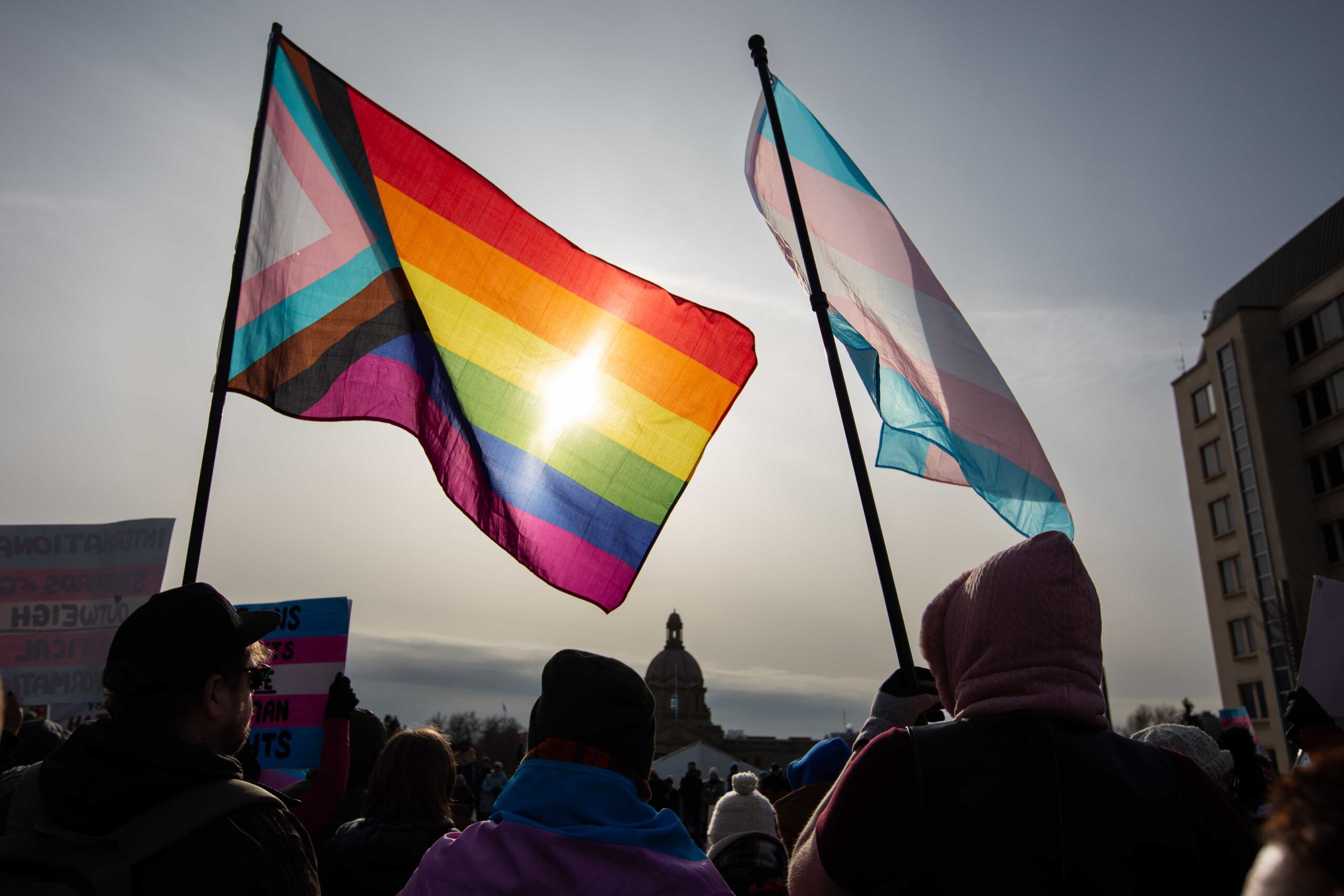Last Wednesday, Alberta premier Danielle Smith announced that her government would bring forward a slew of new policies targeting trans communities under the guise of protecting parental rights, preserving youth’s future options and promoting trans youth’s well-being.
But the Alberta premier’s actual proposals—which take aim at gender-affirming healthcare, sex-ed and trans women in sports—contradict those stated aims and show the government’s hypocrisy. Despite purporting to protect parental rights, the policies actually undermine parents’ right to choose healthcare or sex-ed for their child, undermines kids’ right to choose their own future and openly threatens their well-being.
Parental rights and banning healthcare
Smith’s proposals aim in part to protect parental rights by expanding parents’ rights to be informed and to make decisions regarding their trans youth. The Saskatchewan and New Brunswick governments had previously explained their decision to grant parents a veto over their children’s choice of name and pronouns at school in similar terms.
Conspicuously, however, not all parents see their decision-making powers expanded by the proposed policies. If a parent wishes to support their trans child by consenting to puberty blockers or hormones before 16 years old—let me remind you that puberty blockers are intended for early puberty—they will be prohibited from doing so. In the name of parental rights, Smith’s United Conservative Party will abrogate rights that affirming parents currently have.
Looking behind the facade of protecting parental rights, it is apparent that the policies only aim to protect the rights of parents who do not support their child’s gender journey. Parents who support their child’s gender journey, who are unsure and who are still learning end up left in the dust, with far fewer rights than they used to have.
Parental rights and sexual education
Another announced policy would require schools to secure parental consent for each and every lesson that involves any discussion of gender identity, sexual orientation or human sexuality in K-12 education. The proposed policy departs from the current approach in two major ways. First, it would require all parents to opt their children into the lessons rather than presuming participation and allowing parents to opt out. Second, it would require notification and consent for every single lesson rather than allowing blanket consent.
In all likelihood, the policy will operate as a quasi-ban on sex education and teachings that recognize gender and sexual diversity. Informing parents and documenting their consent for every individual lesson that so much as mentions human sexuality or LGBTQ2S+ existence will be an administrative nightmare. The policy will make it prohibitively difficult, in terms of administrative cost and inconvenience, to hold these lessons. As a result, many schools will simply abrogate all sexual education and disallow teachers from mentioning sexual and gender diversity in the classroom. Others will likely severely reduce their offerings in order to alleviate the administrative burdens imposed by the proposed policy.
For most parents opposed to sex education and LGBTQ2S+ content, the policy will change very little, as they would otherwise have simply opted out. The parents who will be most impacted are parents who want their child to receive a comprehensive and quality education. For those parents, the policy’s net effect will be to severely constrain their choices, if not make it altogether impossible to choose sex education and LGBTQ2S+-inclusive education for their child.
Here, too, the rights of supportive parents are diminished. The only parental rights that Smith’s government seems to care about belong to homophobic and transphobic parents.
Leaving future choices open and banning puberty blockers
When announcing her proposed policies, Smith emphasized that, by banning puberty blockers until 16 years old, she wanted to leave children’s future choices open. While her reasoning would be outweighed by concerns for autonomy and mental well-being when it comes to hormones—gender-affirming care is supported by virtually every major medical association—it also lacks even the most basic coherence when it comes to what puberty blockers are.
Puberty blockers are offered to trans youth upon reaching the first stages of puberty. Their effect is to delay pubertal development until the child begins hormone therapy or chooses to go through endogenous puberty. They are offered for two purposes: to give these youth more time to explore and mature before undergoing irreversible changes and to prevent distressing pubertal developments.
In other words, the purpose of puberty blockers is to leave future choices open. By banning puberty blockers until the age of 16, the Alberta government will force countless trans youth to go through bodily changes that they will have to reverse later. Trans boys—even those who have been out for years—will be forced to experience breast development, forcing many of them to get a mastectomy later. Rather than reducing the number of surgeries or regretted bodily changes, a ban on puberty blockers will starkly increase them.
Far from leaving youth’s future choices open, the proposed ban on puberty blockers until age 16 will foreclose future choices and force them to go through surgeries that they could have avoided if they had access to puberty blockers. This is both cruel and hypocritical.
Wanting the best for trans youth; invoking the notwithstanding clause
Section 33 of the Canadian Charter of Rights and Freedoms, also known as the notwithstanding clause, allows governments to “override” Charter rights. It’s not known if Smith’s government will invoke the notwithstanding clause to shield her proposed policies from constitutional scrutiny (as Saskatchewan premier Scott Moe did), but she indicated her willingness to do so in a press conference on the policies last week.
By invoking the notwithstanding clause, her government would most likely seek to override trans youth’s Section 7 right to “life, liberty and security of the person” and Section 15 right to “the equal protection and equal benefit of the law.” She may also seek to override their Section 12 right to be free from “cruel and unusual treatment or punishment.”
Invoking the notwithstanding clause is thoroughly inconsistent with Smith’s suggestion that these policies aim at trans youth’s best interests. If they are truly in youth’s best interests, how could they violate their right to life, liberty, security and equality? How could they be cruel and unusual treatment or punishment? The notwithstanding clause is unnecessary for policies that are genuinely in youth’s best interests, especially given the margin of discretion that courts afford governments in evaluating the balance of evidence.
The Alberta government has not yet invoked the notwithstanding clause regarding these policies. We do not know if they will. Yet their willingness to do so casts a shadow over their purported benevolent motives. Any government that genuinely believes they are doing right by trans youth would be more than happy to defend their policies in court and demonstrate that they do not violate their rights. Why isn’t the United Conservative Party-led government?
Smith purports to protect parental rights, preserve youth’s future options and promote trans youth’s well-being, but her proposed policies tell a different story—a story of affirming parents losing rights, of trans youth seeing their future options foreclosed and of threats to life, liberty, security and equality. Smith’s compassionate facade poorly hides the true purpose of the proposed policies—appealing to a right-wing base that shows nothing but hatred toward trans communities. The cost of Alberta’s newly proposed anti-trans policies will be counted in stolen happiness, lives ruined and lives lost. That much is clear.


 Why you can trust Xtra
Why you can trust Xtra


